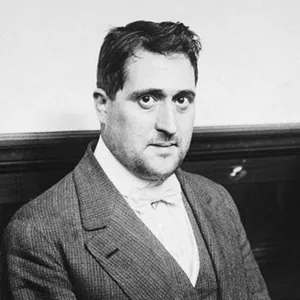
Guillaume Apollinaire (1880–1918) was a pioneering French poet, renowned for his innovative approach to poetry and his influential role in the early 20th-century literary movements, particularly Surrealism and Cubism. His works, marked by striking imagery and experimentation with form, helped redefine the boundaries of modern poetry.
Guillaume Apollinaire Biography
Guillaume Apollinaire was born on August 26, 1880, in Rome, Italy, to a Polish mother, Marie Wyszynska, and an unknown father. Raised in France, he grew up with a complex identity, often reflecting on his ambiguous origins and his sense of alienation. Apollinaire spent his early years in Paris, where he would later become a pivotal figure in the literary scene.
Apollinaire’s early education was fragmented. He attended various schools and learned the classics, but his artistic inclinations led him to pursue a career in writing and art rather than conventional academic paths. During his time in Paris, he met influential figures such as Pablo Picasso, Gertrude Stein, and Jean Cocteau, immersing himself in the avant-garde circles that shaped his intellectual and creative development.
His career as a poet took off in the early 1900s, when he began publishing in progressive literary journals. Apollinaire was a proponent of pushing artistic boundaries, and his poetry often defied traditional norms. He became one of the leading figures of the Symbolist movement, which was characterized by an emphasis on suggestion and indirect expression.
In 1913, Apollinaire coined the term “surrealism,” which later became the defining philosophy of a group of writers and artists, including André Breton and Salvador Dalí. Apollinaire’s poetry merged surrealistic themes and Cubist visual art, making him one of the first poets to engage with the visual arts in such an integrated manner.
During World War I, Apollinaire served as an officer in the French army. He was severely wounded in 1916, which marked a turning point in his health and his work. His injuries would eventually contribute to his early death from influenza on November 9, 1918, at the age of 38. Despite his short life, Apollinaire’s impact on modern poetry and art was profound, and his legacy endures in the works of later poets and artists.
Guillaume Apollinaire Poems
1. Alcools (1913)
This collection is one of Apollinaire’s most famous works, marking adeparture from traditional poetry. “Alcools” blends personal reflection, mythological themes, and modernist experimentation. The poems in this collection use a varietty of forms, from free verse to lyric poetry, and reflect Apollinaire’s interest in shiftingthe boundaries of poetic structure. One of the highlights of this collection is “LePont Mirabeau,” a poignant meditation on love and time.
2. Calligrammes (1918)
A groundbreaking collection that incorporates visual elements intothe poetry, “Calligrammes” presents poems arranged in shapes that complement their themes. Apollinaire’s innovative approach to the form represents his initerest in Cubism and his desire to break away from conventional poetic structures. The collecttion includes both visual experiments and lyrical reflections on war, love, and art.
3. Le Bestiaire (1911)
In this collection, Apollinaire blends poetic imagery with animal symbolism. The poems explore the relationships between humanity and the animal world,often using these creatures as metaphors for human emotions and struggles. “Le Bestiaire” reflects Apollinaire’s interest in visual arts, as some of the poems are accomppanied by illustrations by artist Raoul Dufy.
4. Les Mamelles de Tirésias (1903)
A play written in verse, this work is one of Apollinaire’s earlier ventures into drama. It is a surrealist piece that explores themes of gender and societal norms, uusing absurdity and humor to critique the roles of men and women in society.
5. Le Poète assassiné (1916)
This work presents a fragmented narrative about the life of apoet. It blends fiction and autobiography, capturing the struggles and triumphs of a poet’s life.The title, “The Murdered Poet,” reflects Apollinaire’s feelings of alienation and his personal and artistic battles.
Guillaume Apollinaire Quotes
1.“A poet is a man who has no earthly responsibilities.”
2.“There is no poetry without a great deal of madness.”
3.“The poet does not invent. He listens and repeats what is heard.”
4.“The future is the best thing to come, that’s what keeps me alive.”
5.“The greatest work of art is life itself.”
6.“Art is the only way to run away without leaving home.”
7.“I have been in love with love for as long as I can remember.”
8.“Everything is art: everything is a work of art.”
9.“The more I think, the less I know, and the more I see, the more I understand that nothing is real.”
10.“The most important thing in life is to be passionate.”
Guillaume Apollinaire Facts
1.Apollinaire served as a soldier in World War I and was injured by shrapnel in 1916.
2.He was a close friend and muse to Pablo Picasso, influencing his work and vice versa.
3.Apollinaire coined the term “surrealism” in 1917.
4.His father was absent from his life, and his mother’s Polish origins left him feeling like an outsider.
5.He was born in Rome but was raised in Paris, where he lived most of his life.
6.Apollinaire’s poetry is known for its experimentation with form, including his visual poetry.
7.He was an advocate of avant-garde art and literature, embracing movements like Cubism and Futurism.
8.Apollinaire was involved with the Dada movement in its early stages but later distanced himself from it.
9.His collection “Calligrammes” features poems in the shape of objects, an early example of visual poetry.
10.Apollinaire died shortly after the end of World War I, at the age of 38, from the Spanish flu.
